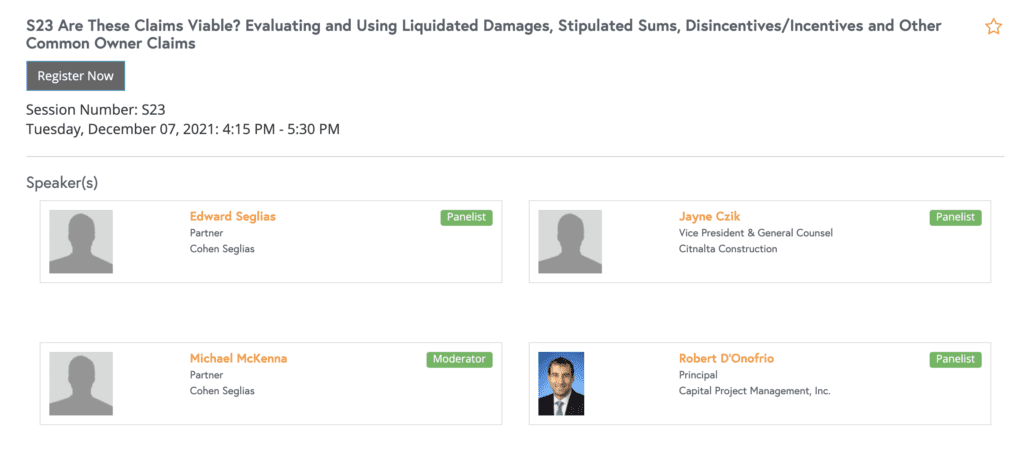ORLANDO, FL – Michael McKenna, the self-described “old man” of Cohen Seglias Pallas Greenhall & Furman PC, already had an engineering degree when he decided to go to law school at night in the 1970s. During those years of study, he maintained a job as project manager for a construction company, ultimately starting his construction law career in 1980.
As a Construction Super Conference panelist for a presentation on Liquidated Damages and Stipulated Sums, McKenna brings his considerable experience, which includes litigation in 22 states. Now focused on New York and New Jersey, McKenna and colleagues (see graphic for date, time, and co-presenters) will operate on the premise that you don’t know as much as you think when it comes to liquidated damages and stipulated sums.

“Liquidated damages are a topic that every construction lawyer runs into on almost a daily basis,” McKenna says. “I have been shocked by how few attorneys really even understand the basics of liquidated damages or stipulated sums.” CSC sat down with McKenna to learn more about the topic and the concepts that will be covered during the Dec. 6-8, 2021 conference in Orlando, Fla.
CSC: Why is there a knowledge gap when it comes to liquidated damages and stipulated sums?
McKenna: They take it as a given, and do not realize that there are many ways to review, modify, and attack liquidated damage provisions.
CSC: What’s your experience within this area?
McKenna: I have successfully had multiple millions of dollars of liquidated damages that were claimed by an owner thrown out by a judge as being a penalty, and not being based upon actual damages. What happens is the owner wants to use the liquidated damages as a hammer against the contractor to counter balance claims that the contractor might have. Let’s say the contractor has claims of five million dollars. The owner may say, ‘Well, you owe me liquidated damages, for starters, of three million dollars, and I’m only looking at two million’ — not recognizing that the three million dollars in liquidated damages may be totally baseless…There is a misconception that there are no major defenses to either liquidated damages or stipulated sums. That is simply not true.
CSC: What’s your history with CSC?
McKenna: At my own firm which I ran for decades, I was a regular participant—attending and speaking. Since I’ve gone to Cohen Seglias, I attended the last one out in Palos Verdes, Calif. [2019] and I planned to be at the one that got canceled. Now I’m speaking on that same topic this year.
CSC: What level of enthusiasm do you expect this year?
McKenna: The first thing is that I have been shocked at the issues created by those who refuse to become vaccinated. With that said, the Super Conference is unique. It not only serves lawyers, it serves clients and consultants, and it’s tailored to suit their needs. It’s also a really good networking space for people to meet new friends and re-establish acquaintances.

THE SESSION – In Brief
While contractors, subcontractors, and other construction practitioners often feel they understand how contractual provisions related to liquidated damages, incentives/disincentives, lane rental charges, stipulated sums and penalty clauses should be applied, quite often the opposite is true. The misuse of such provisions can result in their being deemed invalid as not representing actual damages or as a penalty and thus void as against public policy.
This session will explore the dos and don’ts of using such provisions, including how and when to assess monetary fines. Speakers will also highlight key cases and recent developments in how courts have been evaluating the enforceability and validity of such provisions.
Upon completion of this seminar:
• attendees will gain a greater understanding of how liquidated damages, and other such clauses operate, the need for evaluation of actual damages vs. these provisions, the ways they are distinct from the imposition of penalties (which are generally void as against public policy), and the importance of evaluating the reasonableness of the potential damages in a contract;
• attendees will better understand the legal differences between stipulated damages and actual damages through real life examples, and gain awareness of judicial interpretations as to the validity of these clauses; and attendees will obtain useful information about variations of the liquidated damages provision, including the legality of the imposition of the “lane rental charges” (frequently found in public roadway contracts) whose validity can be questionable.

